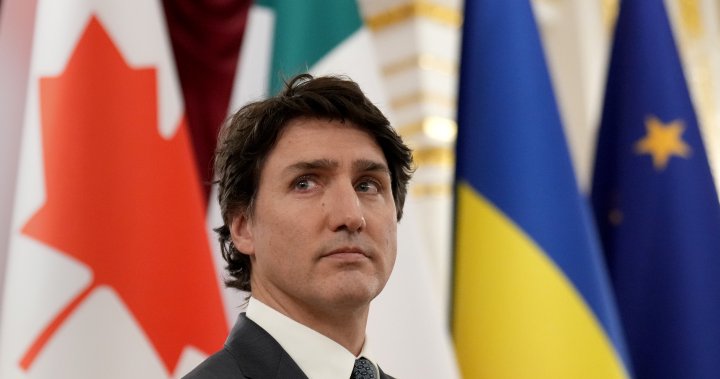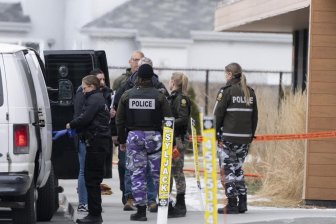Justin Trudeau wrapped up a surprise trip to war-torn Ukraine with a blistering attack on Vladimir Putin Saturday, calling the Russian leader a “weakling” who uses police and the military to crush his opposition.
Speaking with reporters at the end of his visit to the capital Kiyv, Trudeau accused Putin of “executing” opposition leader Alexei Navalny, who died unexpectedly a week ago in the Arctic penal colony where he was serving a 19-year sentence.
Navalny, 47, was roundly considered Putin’s greatest political foe. The Kremlin has rejected allegations that Putin was involved in Navalny’s death, calling them “absolutely unfounded, insolent accusations about the head of the Russian state.”
“I think we know, we’ve seen, repeatedly, the extent to which any opposition in Russia is either marginalized or, quite frankly, executed,” Trudeau said Saturday.
“What happened to Alexei Navalny demonstrates that for all that Putin pretends to be strong, he’s actually a coward,” he continued.
“To execute one’s political opponents, to quash dissent by using police and military, to make sure there is no opposition is the mark of a weakling, not a mark of someone who is confident in his own position.”
Putin is running for a fifth term as president next month in an election he is all but certain to win. Trudeau launched into his attack on the Russian leader when he was asked whether he would recognize the results of that election.
The prime minister’s remarks were the culmination of a day designed to mark the second anniversary of Russia’s 2022 invasion on Ukraine.
Trudeau signed a new security agreement with Ukrainian President Volodymyr Zelenskyy as world leaders gathered in the capital Kyiv.
The agreement is aimed at fortifying both the Ukrainian military and the country’s struggling economy.
It includes some $320 million in new military spending, which is due by the end of the year, and $2.4 billion in loans for Ukraine, to be administered through the International Monetary Fund.
“War isn’t just experienced on the battlefield, it’s lived every day, by everyday people,” Trudeau said of the loans at a news conference in the Ukrainian president’s official residence.
“This money allows roads to be repaired after a bombing. It pays nurses and doctors who keep people healthy, and it supports Ukrainians as they fight back against Russia.”

Trudeau also announced $75 million to help finance the country’s demining efforts and intelligence gathering.
Get the latest National news.
Sent to your email, every day.
The prime minister spent the day in Kyiv alongside leaders from the European Commission, Italy and Belgium. Absent countries, including the United States, the United Kingdom, France and Poland, signalled their allegiance through public statements on social media.
It was part of a global campaign to showcase a politically important display of international solidarity with Ukraine in the face of a plodding, bloody conflict that experts say has no end in sight.
“There will also be ongoing support, over several years, because we are here for the long-term to help Ukraine win a decisive victory against Putin’s unprovoked invasion,” Trudeau said in prepared remarks.
The prime minister also promised $15 million to help complete the Ukrainian National Museum of the Holodomor-Genocide in Kyiv.
Putin launched his long-feared invasion on Feb. 24, 2022, an incursion that soon evolved into a grinding, bloody, full-scale conflict that now has no end in sight.
As he has done from the outset, Trudeau again vowed to ensure Canada stands with Ukraine for as long as it takes to secure victory. But the federal government has yet to deliver all military aid it has promised, prompting critics to accuse the prime minister of going back on his word.
Despite similar sentiments from across the global coalition of support, European countries are struggling to find enough stocks to send to Kyiv, while $60-billion worth of U.S. help is stalled over political differences.
The delays have frustrated Zelenskyy, who fears — like others — that such delays and domestic political conflict are playing right into the hands of an ever-patient Putin.
Just last week, Russia took complete control of the city of Avdiivka, about 706 kilometres east of the capital, where troops had battled fiercely over the local chemical plant for weeks.
And a Russian drone attack late Friday struck a residential building in the southern city of Odesa, killing at least one person and injuring several others.
Zelenskyy himself warned allies just last week that an “artificial deficit” of arms risks giving Russia a dangerous advantage.

Meanwhile, U.S. President Joe Biden has been cajoling and criticizing Republicans in Congress to help pass legislation to keep the support flowing.
“The failure to support Ukraine at this critical moment will not be forgotten. Now is the time for us to stand strong with Ukraine and stand united with our allies and partners,” Biden said in a statement.
“Now is the time to prove that the United States stands up for freedom and bows down to no one.”
Biden has chided his political opponents, including former and would-be future president Donald Trump, for inflamed rhetoric around Ukraine and a lack of support that borders on what the current commander-in-chief calls “criminal neglect.”
Trudeau has reached for similar reprovals when it comes to Canada’s Opposition Conservatives and their recent decision to vote against a modernized free-trade deal with Ukraine.
But in contrast to the U.S., both parties have tried to position themselves domestically as the more committed ally: Canada is home to the world’s second-largest Ukrainian diaspora population, after Russia.
“It’s been two years since Ukraine woke up to the evil of an unprovoked full-scale invasion from Vladimir Putin,” Conservative Leader Pierre Poilievre posted Saturday on X, formerly Twitter.
“Canada will always stand with Ukraine in the fight for freedom and democracy against Putin’s tyranny.”
The prime minister’s show of solidarity in Kyiv also provides an opportunity to help restore the relationship’s lustre after a gaffe during Zelenskyy’s visit to Ottawa last fall set off an international embarrassment.
With the Ukrainian president in the House of Commons, members of Parliament paid a war hero’s tribute to a Ukrainian-Canadian veteran who turned out to have fought for the Nazis in the Second World War.
The incident made headlines around the world, prompted a prime ministerial apology, cost former House Speaker Anthony Rota his job and provided ample fodder for Russia’s propaganda machine.




